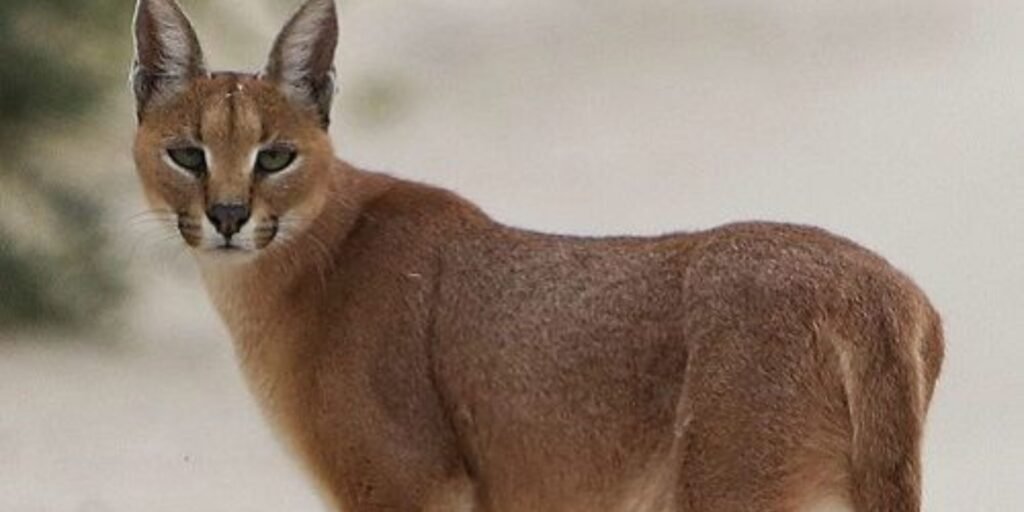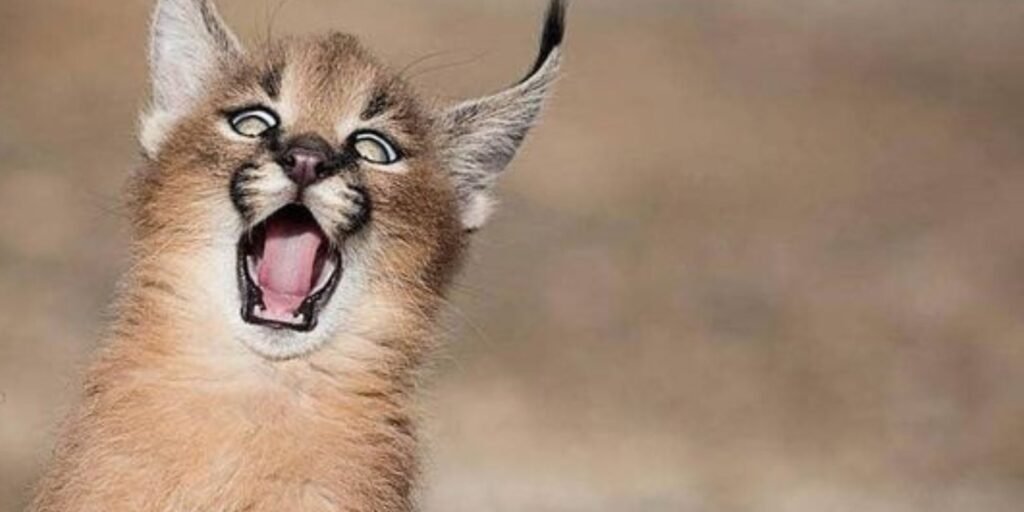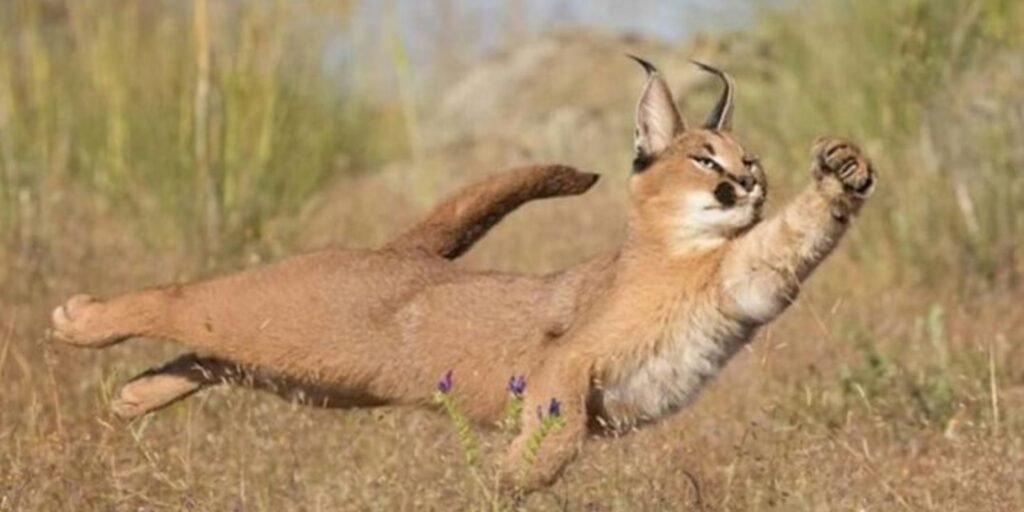Caracals are striking wild cats native to parts of Africa, the Middle East, and Central Asia. Known for their large ears, muscular bodies, and elegant grace, these creatures often capture the fascination of wildlife enthusiasts. With their beauty and agility, it’s no wonder people sometimes wonder, are caracals good pets? This question is crucial as owning a caracal involves significant responsibility and understanding of the animal’s needs, behavior, and legal implications. In this article, we will examine whether caracals make good pets, the challenges involved, and the factors that potential owners should consider before deciding to bring one into their home.
Understanding the Caracal: A Wild Cat
Caracals (Felis caracal) are medium-sized wild cats that weigh between 20 and 40 pounds and are known for their distinctive tufted ears, muscular bodies, and long legs. Their tan or reddish-brown coat and sleek appearance make them look like an exotic cross between a lynx and a cheetah. Although they are not as large as some of the bigger wild cats, caracals are incredibly agile and strong. These cats are skilled hunters and are known for their ability to leap great distances, often catching birds mid-flight with their powerful hind legs.
Caracals are solitary animals by nature, and they are typically found in dry, open savannas or rocky, hilly areas in the wild. While their physical beauty and hunting prowess might make them appealing as exotic pets, it’s important to recognize that they are wild animals with instincts, behaviors, and needs that differ significantly from domesticated cats.
Are Caracals Domesticated Animals?

One of the most important considerations when thinking about owning a caracal as a pet is that it remains a wild animal, not a domesticated one. Unlike house cats, which humans have selectively bred over thousands of years for companionship, caracals retain their wild instincts.
Are caracals good pets? :The Challenges of Owning a Caracal
Owning a caracal requires significant effort, resources, and an understanding of the animal’s needs. While they are beautiful and intriguing, keeping one as a pet presents many challenges.
Space Requirements
Caracals are agile and active animals that require a lot of space to roam, climb, and exercise. In the wild, they cover large areas in search of food and shelter, and a small apartment or confined backyard would not be adequate for their needs. Unlike domesticated cats, which can thrive in smaller spaces, caracals need a spacious, secure environment that mimics their natural habitat.
Hunting Instincts and Dietary Needs
Caracals are natural hunters with a strong predatory drive. In the wild, they hunt birds, rodents, and other small mammals, and they rely on their excellent jumping ability to catch prey. This instinct does not disappear when they are kept in captivity. Pet owners would need to provide a diet that satisfies their caracal’s hunting instincts and nutritional requirements.
Caracals require a high-protein diet similar to that of other wild cats. Their food should consist mainly of raw meat, including whole animals like rabbits or birds. Providing a diet that mimics what they would eat in the wild is essential for keeping them healthy.
In addition to their dietary needs, caracals may engage in hunting behavior, even when they are not hungry.
Behavior and Temperament
Caracals are not domesticated, and as such, they do not have the same social tendencies as house cats. They are solitary creatures in the wild, often only interacting with others of their species for mating. While caracals can be trained to tolerate human presence and even form bonds with their owners, their instincts for independence remain strong.
Caracals are not typically affectionate animals like domestic cats or dogs. They do not seek constant attention or companionship and may prefer to spend most of their time alone. Pet owners should be prepared for the possibility of a caracal being distant or aloof, as they may not enjoy being petted or handled in the same way that traditional pets do.
Health Risks and Veterinary Care
Finding a veterinarian with experience in treating exotic animals like caracals can be challenging. Caracals require specialized care to address their health needs, and not all veterinarians are equipped to handle such animals. Regular checkups, vaccinations, and emergency care can be difficult to arrange, and many exotic pets, including caracals, suffer from a lack of proper medical attention.
Furthermore, caracals, like other wild cats, are susceptible to certain diseases and health conditions. Without the proper diet and exercise, they can develop obesity, dental issues, and behavioral problems.
Legal and Ethical Considerations

Before acquiring a caracal, potential owners must thoroughly research the legal regulations surrounding the ownership of exotic animals in their area. In many countries and states, laws either heavily regulate or outright prohibit keeping a caracal as a pet. These laws protect both the animals and people who might face harm from owning a wild animal.
Even if local laws permit owning a caracal, ethical concerns should influence the decision. Some argue that captive breeding programs could help preserve the species, but others believe that keeping a caracal as a pet leads to physical and emotional harm for the animal, especially if it doesn’t have an environment that suits its needs.
Another issue to consider is the capture and trade of wild animals for the exotic pet market. In many cases, people take wild caracals from their natural habitats to sell as pets. This practice negatively impacts the species’ population and ecosystem.
Are caracals good pets? :Pros of Having a Caracal as a Pet
Despite the many challenges involved, there are some potential benefits to having a caracal as a pet for the right individual.
- Unique and Exotic Appearance
Caracals are incredibly beautiful and unique animals. Their large, tufted ears, sleek coat, and graceful build make them stand out among other pets. For those interested in exotic animals, having a caracal as a pet provides the opportunity to own a rare and striking creature.
- Intelligent and Trainable
Although they aren’t domesticated, caracals are intelligent animals. They can learn to perform certain behaviors, such as coming when called or walking on a leash. With patience and consistent training, some caracals can form a bond with their owners and learn to live peacefully in a domestic setting.
- Fulfilling the Need for Wildlife Conservation
In some cases, owning a caracal can provide an opportunity for wildlife conservation. When bred in captivity under controlled conditions, caracals can contribute to efforts to preserve the species and educate the public about wildlife conservation.
Conclusion: Are Caracals Good Pets?

In conclusion, caracals are not ideal pets for most people. While they are captivating and beautiful creatures, their wild nature, unique needs, and complex care requirements make them challenging to keep in a home environment.
For those considering keeping a caracal as a pet, it’s essential to weigh the challenges against the rewards. Proper care requires significant effort, time, and financial resources.

